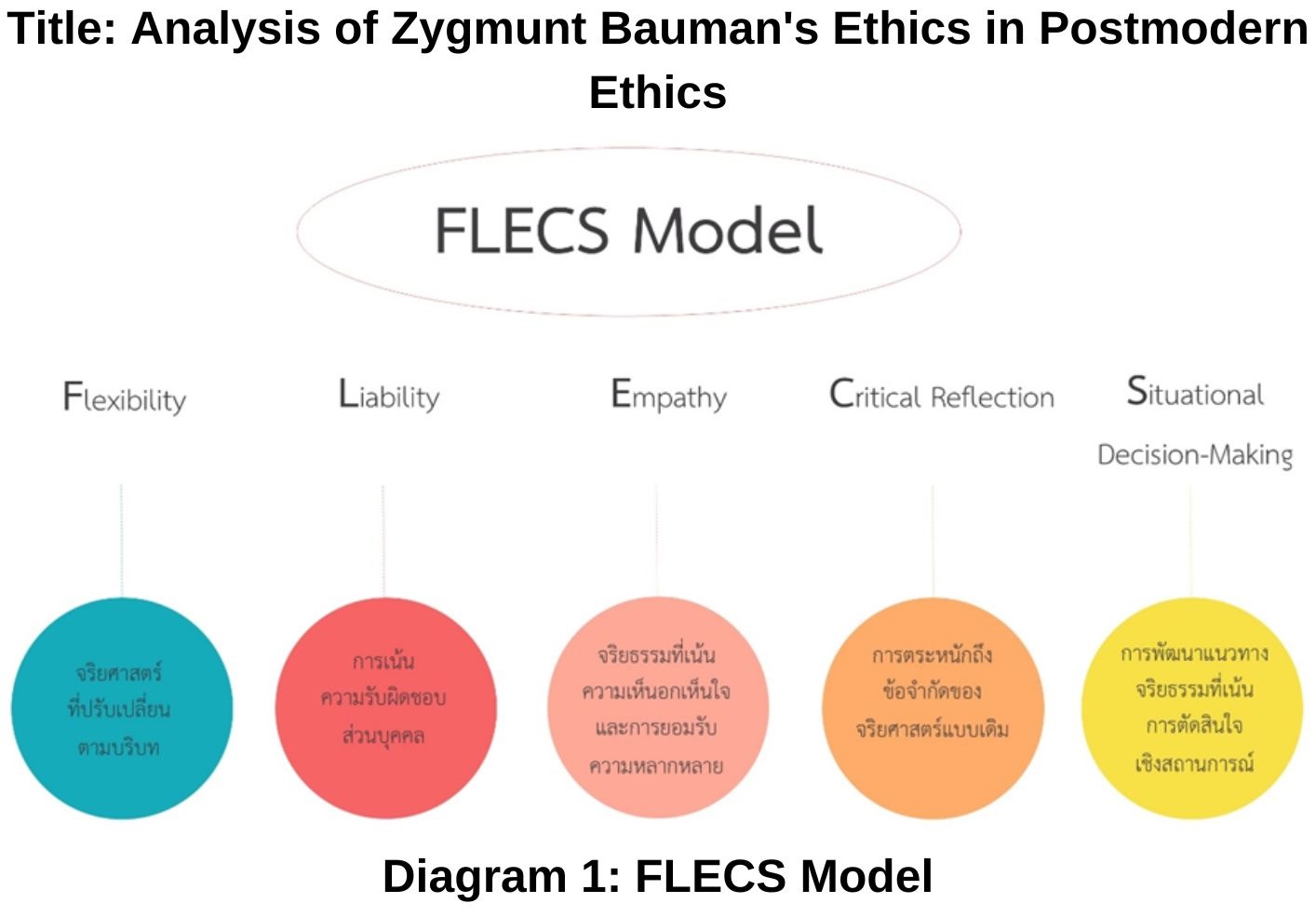Analysis of Zygmunt Bauman's Ethics in Postmodern Ethics
Keywords:
Ethics, Zygmunt Bauman, PostmodernAbstract
This study analyzed the ethical concepts of Zygmunt Bauman as presented in his book Postmodern Ethics (1993), identifying three key findings. First, Bauman’s postmodern ethics emphasized the importance of uncertainty and complexity in postmodern society, contrasting with traditional ethics, which adhered to rigid rules and fixed moral codes. Bauman proposed that ethics should be viewed as a dynamic process that adapts to specific situations, prioritizing personal responsibility and the recognition of the value of diversity and interpersonal relationships. Second, Bauman highlighted the deep connection between ethics and society, particularly the role of ethics in fostering understanding and relationships within a diverse and morally challenging society. He underscored that ethical responsibility is unavoidable and must begin with mutual understanding and empathy. Third, Bauman’s ethical principles were found to have broad applicability in contemporary contexts. These ideas reflected ethical flexibility, which is a crucial approach to navigating the complexities of modern society.
References
กันยาวีร์ สัทธาพงษ์. (2562). การประยุกต์ใช้อรรถปริวรรตการตีความปรัชญาของเศรษฐกิจพอเพียงในเรื่องเกษตรทฤษฎีใหม่เพื่อสร้างสมดุลชีวิตอย่างยั่งยืนด้วยมุมมองปรัชญาหลังนวยุค. วารสารเซนต์จอห์น, 22(30), 236-253.
ชัยโรจน์ นพเฉลิมโรจน์. (2565). การคิดนวัตกรรมด้วยหลักการทรงงานตามหลักปรัชญาหลังนวยุค. วารสารการวิจัยเพื่อพัฒนาชุมชน, 15(2), 111-117.
ชิสา กันยาวิริยะ และ สิรินทร์ กันยาวิริยะ. (2567). ผู้นําคุณธรรมตามหลักปรัชญาหลังนวยุคสายกลาง. วารสารสถาบันพอดี, 1(6), 9-18.
นาวิน พิชญวิศิษฏ์กุล. (2560). ปรัชญาหลังนวยุค : อะไร อย่างไร และทำไม. วารสารปรัชญาปริทรรศน์, 22(1), 147-155.
พจนา มาโนช. (2567). คุณภาพชีวิตในการทํางานตามหลักปรัชญาหลังนวยุคสายกลาง. วารสารสถาบันพอดี, 1(11), 1-14.
พระครูโอภาสสราธิคุณ (ชาตรี อาสโภ). (2564). พุทธธรรมาภิบาลกับปรัชญาหลังนวยุคสายกลาง. วารสารสันติศึกษาปริทรรศน์ มจร, 9(4), 1444-1454.
พระมหาอนันต์ อนุตฺตโร (อันวิเศษ) และคณะ. (2565). หลังโครงสร้างนิยมกับอรรถปริวรรต. วารสารปรัชญาปริทรรศน์, 27(2), 257-271.
เมธา หริมเทพาธิป (2563) การจูงใจตนเองในแนวทางหลังนวยุค. วารสารพุทธมัคค์, 5(1), 99-107.
สิรินทร์ กันยาวิริยะ และ ชิสา กันยาวิริยะ. (2567). การบริหารแบบมีส่วนร่วมตามหลักปรัชญาหลังนวยุคสายกลาง. วารสารสถาบันพอดี, 1(7), 27-40.
สุดธิณีย์ ทองจันทร์, เมธา หริมเทพาธิปและ กีรติ บุญเจือ. (2563). การพัฒนาคุณภาพชีวิตผู้ป่วยด้วยหลักปรัชญาหลังนวยุคสายกลาง. วารสารการวิจัยการบริหารการพัฒนา, 10(1), 31-41.
Bauman, Z. (1993). Postmodern Ethics. Oxford : Blackwell.
Butler, J. (2004). Undoing gender. New York : Routledge.
Levinas, E. (1961). Totality and infinity : An essay on exteriority. Pittsburgh, PA : Duquesne University Press.
Lyotard, J.-F. (1979). The postmodern condition: A report on knowledge. Minneapolis : University of Minnesota Press.
Rorty, R. (1989). Contingency, irony, and solidarity. Cambridge : Cambridge University Press.
Trujillo, D. (2018). Multiparty alliances and systemic change : The role of beneficiaries and their capacity for collective action. Journal of Business Ethics, 150(2), 425-449.

Downloads
Published
How to Cite
Issue
Section
License
Copyright (c) 2025 Institute of Sufficiency Journal

This work is licensed under a Creative Commons Attribution-NonCommercial-NoDerivatives 4.0 International License.



